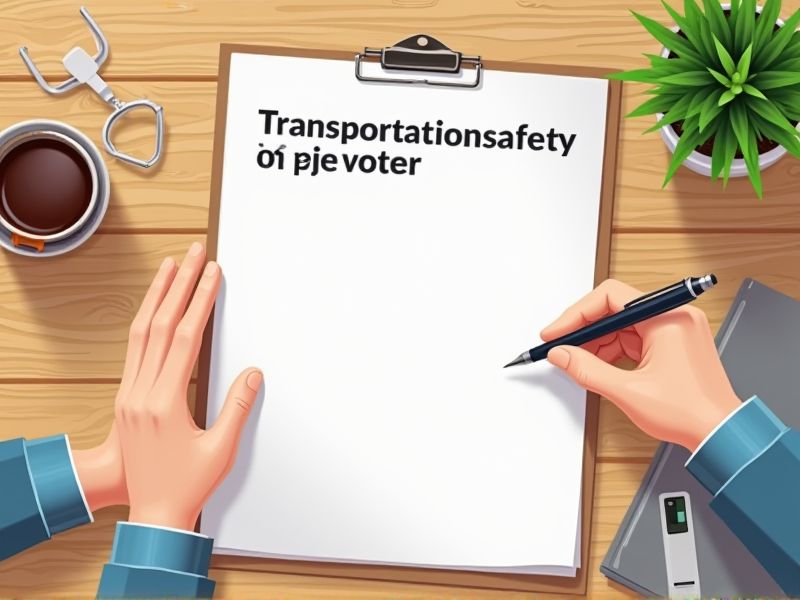
Transportation safety inspectors play a critical role in ensuring that transportation systems operate safely and comply with established standards. Certain certifications equip them with specialized knowledge and skills necessary to assess transportation operations and identify potential hazards effectively. These certifications often validate a professional's ability to navigate complex regulatory environments and implement best practices. Some important certifications you may need for a Transportation Safety Inspector include the Certified Safety Professional (CSP) and Certified Transportation Professional (CTP).
FMCSA Roadside Inspection Certification
The FMCSA Roadside Inspection Certification is essential for transportation safety inspectors to ensure they possess up-to-date knowledge on federal safety regulations. Certification helps inspectors accurately identify safety violations, which can lead to immediate corrective actions and prevent road accidents. Trained inspectors contribute to reducing commercial vehicle incidents by ensuring compliance with safety standards. Consistent enforcement of safety protocols through certified inspections positively impacts overall public road safety.
OSHA 30-Hour General Industry Safety Certification
Transportation safety inspectors face various workplace hazards, and OSHA 30-Hour General Industry Safety Certification provides comprehensive training to identify and mitigate these risks. This certification enhances inspectors' understanding of safety protocols, reducing the likelihood of accidents and injuries. Employers often mandate this certification to ensure compliance with federal safety regulations, thereby avoiding potential fines or legal issues. By equipping inspectors with necessary safety knowledge, transportation systems maintain operational efficiency and safety standards.
Certified Safety Professional (CSP)
The Certified Safety Professional (CSP) credential equips transportation safety inspectors with advanced knowledge that enhances their ability to identify potential hazards effectively. Possessing a CSP ensures adherence to industry standards, leading to improved compliance with safety regulations across transportation systems. When inspectors hold a CSP, there's a tangible reduction in accident rates because they apply comprehensive risk management strategies. The credential signifies a commitment to safety excellence, which bolsters the credibility and trustworthiness of safety inspections conducted in the transportation sector.
Hazardous Materials (HAZMAT) Endorsement Certification
A HAZMAT Endorsement Certification equips transportation safety inspectors with the necessary knowledge to identify and manage hazardous materials effectively. This certification ensures inspectors understand regulations, minimizing risks during the transport of dangerous goods. Proper identification and handling of hazardous materials prevent accidents and environmental damage. Enhanced training through certification reduces the likelihood of human error in transportation safety procedures.
Transportation Worker Identification Credential (TWIC)
Transportation safety inspectors rely on the Transportation Worker Identification Credential (TWIC) to ensure secure access to restricted or sensitive areas within maritime transportation facilities. The credential verifies an individual's identity and undergoes a security threat assessment, reducing the risk of unauthorized personnel accessing critical infrastructure. The requirement for TWIC enhances the overall security framework, safeguarding both personnel and cargo. With TWIC, inspectors can more efficiently and accurately perform their duties without security clearance delays.
Commercial Vehicle Safety Alliance (CVSA) Certification
CVSA Certification ensures transportation safety inspectors are knowledgeable about standardized inspection procedures, enhancing consistency and reliability in safety checks. By having CVSA Certification, inspectors can help reduce the risk of accidents attributed to mechanical failures or non-compliance with regulations. Access to CVSA training updates allows inspectors to stay informed about the latest safety protocols and technologies, improving overall road safety. A certified inspector's credentials can increase public trust in transportation systems, thereby promoting a culture of safety and compliance.
Certified Transportation Professional (CTP)
Certified Transportation Professional (CTP) provides comprehensive industry knowledge that enhances safety protocols for a transportation safety inspector. Knowledge gained through CTP certification aids inspectors in understanding complex safety regulations and their implications, leading to more effective enforcement. The credibility of the CTP credential instills trust, encouraging adherence to best safety practices among transportation stakeholders. Enhanced skills from this certification support efficient identification and rectification of potential safety hazards.
National Safety Council (NSC) Defensive Driving Certification
The NSC Defensive Driving Certification equips transportation safety inspectors with essential skills to identify and mitigate potential hazards on the road, thereby reducing accident rates. Achieving this certification demonstrates a comprehensive understanding of safe driving principles, which enhances the ability to enforce regulations effectively. It supports the development of critical decision-making abilities in high-pressure situations, leading to improved safety outcomes. This certification also aligns with industry standards, which can boost public trust and ensure compliance with national safety regulations.
Certified Public Fleet Professional (CPFP)
The Certified Public Fleet Professional (CPFP) credential enhances the expertise of a transportation safety inspector by imparting specialized knowledge in fleet management. This specialization ensures that the inspector can assess maintenance and operational efficiency, which directly impacts the safety of transportation systems. Certification establishes a standardized level of competence and accountability, reducing the likelihood of safety oversights. By acquiring CPFP credentials, the inspector is equipped to implement best practices for safety protocols and compliance within the fleet, ultimately promoting a safer transportation environment.
Certified Industrial Hygienist (CIH)
Certified Industrial Hygienists are essential for transportation safety inspectors because they possess specialized knowledge in identifying and controlling environmental hazards, which mitigates risks. Their expertise ensures compliance with occupational safety standards, reducing the likelihood of health issues among workers. Employing a CIH contributes to comprehensive risk assessments, improving overall safety protocols in the transportation sector. Their role in developing and implementing effective safety measures enhances the well-being of both employees and the public.
Summary
By achieving certifications, you enhance your credibility and expertise in transportation safety. This often results in improved trust from employers and peers, leading to career advancement opportunities. Your certified knowledge assures more effective implementation of safety protocols, which can reduce accidents and incidents. The overall safety culture within transportation organizations often improves, benefiting public safety.
